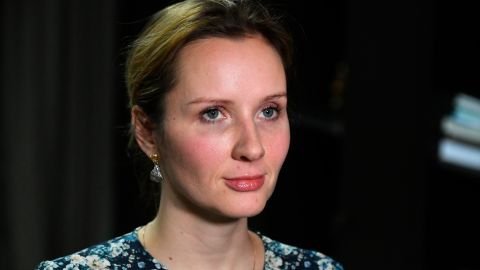The Daily Observer London Desk: Reporter- James Richards
Read Maria Lvova-Belova’s social media, and one might think Russia is selflessly delivering Ukrainian children from evil into the care of Russian families desperate to share their love.
But according to American and European governments – and a new report by Yale investigators, backed by the US State Department – she is at the center of a Russian government scheme to forcibly deport thousands of Ukrainian children to Russia, often to a network of dozens of camps, where the minors undergo political reeducation.
“Maria Lvova-Belova is one of the most highly involved figures in Russia’s deportation and adoption of Ukraine’s children, as well as in the use of camps for ‘integrating’ Ukraine’s children into Russia’s society and culture,” the Yale Humanitarian Research Lab’s Conflict Observatory wrote.
Lvova-Belova, who was appointed to be President Vladimir Putin’s Commissioner for Children’s Rights in 2021, created her Telegram channel days after Russia’s full-scale invasion of Ukraine.
Between photos alongside the who’s who of Russian power – from Putin to Foreign Minister Sergey Lavrov to Chechen Leader Ramzan Kadyrov – she posts glossy photos and videos of the wonderful life supposedly being offered to Ukrainian children.
“By the end of the week, one hundred and eight orphans of Donbass who have received Russian citizenship will have parents,” Lvova-Belova wrote in a typical post on her Telegram channel last July, using the Russian spelling for Ukraine’s Donbas (Donetsk and Luhansk) regions. “Shurochka was the first to be handed over to her mother. When I heard this happy child’s laughter, I could not hold back [tears].”
Lvova-Belova regularly visits Russian occupied-Ukraine, and the Russian government boasts of her personally escorting planeloads of children back from Ukraine. Putin has empowered Lvova-Belova to use unspecified “additional measures” to identify children who don’t have parental care in the four Ukrainian regions it claims who have annexed.
UNICEF, the United Nations’ children’s organization, has said that “adoption should never occur during or immediately after emergencies,” and that during upheaval, children separated from their parents cannot be assumed to be orphans. The UN furthermore considers forcibly transferring another country’s population within or beyond its borders to be a war crime.
Russia has characterized reports of forcible relocation as “absurd” and said it does its “best” to keep minors with their families.
In another typical post, from December, Lvova-Belova distributed photos sitting at around the dinner table with a Russian family in the Kaluga region.
“I will be frank, I was crossing the threshold with trepidation: how have they settled in, have they got everything they need, how have the relations with parents and other children in the family worked out,” she wrote. “But all doubts were swept aside in the first minutes. The family is wonderful!”
“For me, this is yet another confirmation that the work that we have done on the placement of orphans from Donbass is not in vain. Everything was done right.”
The United States, European Union, and United Kingdom have all sanctioned her for her alleged role in the scheme. “Lvova-Belova’s efforts specifically include the forced adoption of Ukrainian children into Russian families, the so-called ‘patriotic education’ of Ukrainian children, legislative changes to expedite the provision of Russian Federation citizenship to Ukrainian children, and the deliberate removal of Ukrainian children by Russia’s forces,” the U.S. Treasury said in September.
She has reveled in the designation.
“My thanks go to the British for the attention they have drawn to our mission of helping children in Donbass,” she wrote in June. “In Russia we enjoy friendship as families, as organizations, and as of now, as those affected by sanctions.”
Lvova-Belova is herself mother to at least ten children – some biological and some adopted – with her husband, who is an Orthodox priest.
Born in the western city of Penza, Lvova-Belova began her career as a children’s guitar teacher. She eventually became involved in local politics, working her way up through the Russian power structure.
In a tearful television news report posted to her Telegram channel in November, Lvova-Belova recalled adopting a teenage boy from Mariupol, who said that he had been put on the streets by the guardians who took him in after his mother died of cancer.
“This is the most beautiful person I’ve ever met in my life,” Filip says of his adoptive mother. “I never had anyone love me so much as she does.”
The circumstances in which the young man gave the interview are unclear, including whether he made statements under duress.
For the children of Ukraine, she has launched a program called “The Day After Tomorrow” to help ease them into Russian life.
Alongside idyllic photos of campfires by the Black Sea, she said last August that Ukrainian children from the Donetsk region are in for an “extraordinary camp season.”
“The camp has nine thematic workshops to enable teenagers to work out their life plans and professional guidelines. We look forward to the opening of the camp!”
Russia’s embassy in Washington on Wednesday dismissed as “absurd” US accusations that Ukrainian children were moved by force.
“We took notice of the absurd statements of State Department Spokesperson Ned Price, who had accused our country of ‘forced transfer and deportation of Ukrainian children’ to the territory of the Russian Federation,” the embassy said in a statement on Telegram.
“Russia accepted children who had been forced to flee with their families from the shelling and atrocities of the Armed Forces of Ukraine. We do our best to keep minors in families, and in case of absence or death of parents and relatives – to transfer orphans under guardianship. We ensure the protection of their lives and well-being.”
The embassy went on to accuse Washington, which has provided military aid to Ukrainian armed forces, of being complicit in the alleged deaths of children in Russian-occupied eastern Ukraine.



